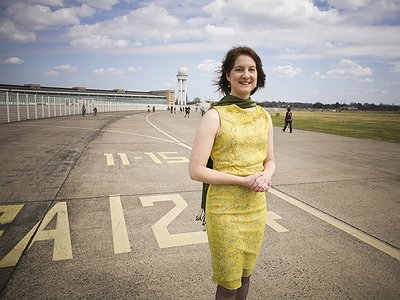Part 2
How do you make use of technology? In terms of the feedback mechanism between technology and creativity, what do humans excel at, what do machines excel at?
I consider technology a necessary evil. I move the piece to the computer (from the pencil-and-paper and piano) as late as possible in the process, but I do complete orchestrational details in Sibelius and I am my own copyist, because I find that I want to have the freedom to let ideas in as they come, all the way to the very end of the process.
Collaborations can take on many forms. What role do they play in your approach and what are your preferred ways of engaging with other creatives, including the artists performing your work?
I have such a passionate and emotional connection with the people I am writing for that it can sometimes feel like they – their beautiful existence – is what is actually writing the piece for me, through me. This process is mostly emotional, however, since I am usually far away from my performers, dreaming about them but not actually trying out ideas with them. Sometimes I will reach out, especially in the case of virtuoso soloists, to get feedback. Vireo librettist Erik Ehn, director Charlie Otte and I had a really magical connection that required practically no verbal communication. We just felt our way forward, each in our own sphere, with incredible trust – sparring each other on to ever more crazy challenges. It was a thrill – and the best collaboration of my life thus far.
How is writing the music and having it performed live connected? What do you achieve and draw from each experience personally? How do you see the relationship between improvisation and composition in this regard?
By the time I hear the premiere of a piece, I’ve usually written one or more other pieces since it was completed. So it’s like opening a gift that you wrapped for yourself, months and months ago! Probably because of this separation in time, I have come to see the two experiences as pretty separate. There is incredible satisfaction (ideally) in both, but improvisation doesn’t really enter into either for me.
Time is a variable only seldomly discussed within the context of contemporary composition. Can you tell me a bit about your perspective on time in relation to a composition and what role it plays in your work?
I think about time a lot! Pacing of ideas is the key to their landing ‘just so,’ in the listener’s experience. I think of myself as a guide, a gracious host for listeners who is guiding them through an experience. I rehearse that experience in my mind, during the compositional process. What has my listener just heard? How long have they been with me and what have they experienced so far? Time is every human being’s most precious possession, and when listeners give us their time, we owe it to them to honor that, and to be a caring and thoughtful architect of their experience of time as it unfolds.
How do you see the relationship between the 'sound' aspects of music and the 'composition' aspects? How do you work with sound and timbre to meet certain production ideas and in which way can certain sounds already take on compositional qualities?
Each piece has its own parameters (timbre, architecture, texture, etc.) that are its key elements of exploration. Not every parameter can be explored meaningfully in one piece. So it is important to sit patiently with a piece during that awkward beginning stage (the long walks, the conceptual work) to learn from it what kind of piece it wants to be. What are its preoccupations? Is it concerned with sounds? With ideas? Through what means?
Our sense of hearing shares intriguing connections to other senses. From your experience, what are some of the most inspiring overlaps between different senses - and what do they tell us about the way our senses work? What happens to sound at its outermost borders?
I am not a very visual person, so for me it tends to be the kinetic experience and emotional memory that are triggered by deeper listening. The tensions within time – twenty years, or twenty measures, or twenty seconds – and how all of that feels in my body.
Art can be a purpose in its own right, but it can also directly feed back into everyday life, take on a social and political role and lead to more engagement. Can you describe your approach to art and being an artist?
I have always wished for my work to build a community, in small ways and large ways. Sometimes the work can address itself directly to ‘issues,’ but music tends to resist depictive purposing, ‘message’-driven uses. This is its beauty. It does, however, partner beautifully with forming bonds between people – and so I focus on the ways in which my music can do that.
It is remarkable, in a way, that we have arrived in the 21st century with the basic concept of music still intact. Do you have a vision of music, an idea of what music could be beyond its current form?
Nope! Seems like trying to articulate a vision of breathing, or of eating. I don’t agree that music can be described as a basic ‘concept.’ I see it more as a uniquely human manifestation.






